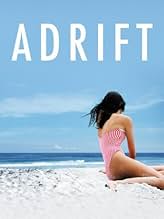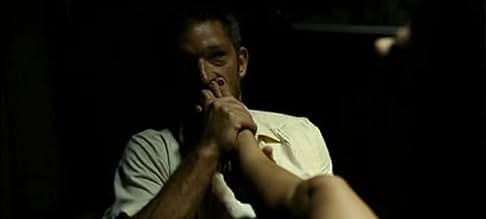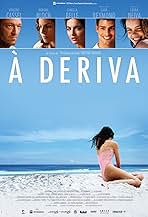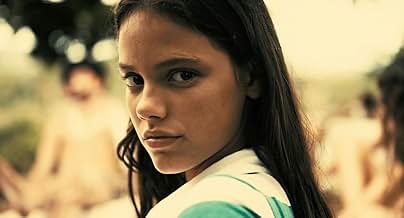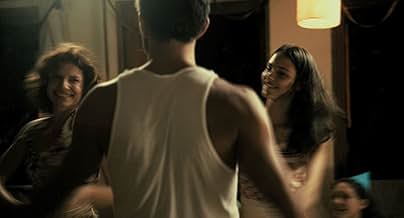IMDb-BEWERTUNG
6,7/10
3122
IHRE BEWERTUNG
Ein Drama aus den 1980er Jahren über ein Mädchen im Teenageralter, das sein sexuelles Erwachen erlebt, als sie von den Untreue ihres Vaters erfährt.Ein Drama aus den 1980er Jahren über ein Mädchen im Teenageralter, das sein sexuelles Erwachen erlebt, als sie von den Untreue ihres Vaters erfährt.Ein Drama aus den 1980er Jahren über ein Mädchen im Teenageralter, das sein sexuelles Erwachen erlebt, als sie von den Untreue ihres Vaters erfährt.
- Regie
- Drehbuch
- Hauptbesetzung
- Auszeichnungen
- 8 Gewinne & 24 Nominierungen insgesamt
Empfohlene Bewertungen
Nonstop asking of "What's wrong?" with the continuous wailing & gnashing of teeth. Anyone who could handle being midst this crowd of characters, especially the glum-faced teen lead, probably needs therapy as much as the characters in the film.
I don't understand why i keep being told i need to write more & more when there are always numerous reviews that are way short of the "required" length.
I don't understand why i keep being told i need to write more & more when there are always numerous reviews that are way short of the "required" length.
ADRIFT (À Deriva) is a reflection of the eponymous certain summer every young teenager experiences. By setting this story of discovery - of parental flaws and infidelities as well as the coming into flower sexually - in the 1980s, before cellphones and emotional isolation crept into our lives, and by placing it in the idyllic setting of the exotic Brazilian seaside, writer/director Heitor Dhalia avoids the gimmicks and interruptions upon which we all new rely and instead allows the story to unfold as a personal journey as seen form the eyes of a fourteen-year old youth. It is a quite miracle of a film.
Famous author Matthias (Vincent Cassel) has brought his family from São Paulo for a summer vacation: his beautiful, alcoholic, frustrated wife Clarice (Débora Bloch), his young son Antônio (Max Huzar), his middle daughter Fernanda (Izadora Armelin), and his fourteen- year-old daughter Filipa (Laura Neiva). The interaction with Matthias and his children is warm and sincere but there seems to be a stress between Matthias and Clarice. The children spend their days at the beach where Filipa begins to recognize the onset of her coming of age when young Artur (Daniel Passi) comes on to her. Filipa is anxious about the onset of femininity and wonders about the perceived friction between her parents. She discovers evidence of her father's affair with an American tourist Ângela (Camilla Belle) living at the beach and spies on the couple in their clandestine meetings. In response she pays more attention to Artur and to a handsome bartender (Cauã Reymond) whom she has discovered having an assignation with Ângela. When Matthias and Clarice finally confront their children about the real reason for the summer vacation from São Paulo and their intention to separate, Filipa realizes that her parents' marriage is a mutual sham and finds her own way of escaping the realities she has discovered: she is left adrift on the sea of Life and must find her own choices of how to face her femininity, her concepts of relationships, and fragility of fidelity.
In Heitor Dhalia sure hands this film is a tender pleasure to watch: making the focus of the story center on the relationship between Mathias and his daughter Filipa he allows us to understand the various aspects of the fragmenting family. None of this could happen were it not for the meticulously perfect performances by the entire cast - with special emphasis on Vincent Cassel and Laura Neiva and Débora Bloch. The cinematography by Ricardo Della Rosa sensitively uses the water supporting bodies as a visual metaphor, from above and from below the surface just as the film reveals the obvious and occult aspects of a failing marriage. The film is in Portuguese with English subtitles.
Grady Harp
Famous author Matthias (Vincent Cassel) has brought his family from São Paulo for a summer vacation: his beautiful, alcoholic, frustrated wife Clarice (Débora Bloch), his young son Antônio (Max Huzar), his middle daughter Fernanda (Izadora Armelin), and his fourteen- year-old daughter Filipa (Laura Neiva). The interaction with Matthias and his children is warm and sincere but there seems to be a stress between Matthias and Clarice. The children spend their days at the beach where Filipa begins to recognize the onset of her coming of age when young Artur (Daniel Passi) comes on to her. Filipa is anxious about the onset of femininity and wonders about the perceived friction between her parents. She discovers evidence of her father's affair with an American tourist Ângela (Camilla Belle) living at the beach and spies on the couple in their clandestine meetings. In response she pays more attention to Artur and to a handsome bartender (Cauã Reymond) whom she has discovered having an assignation with Ângela. When Matthias and Clarice finally confront their children about the real reason for the summer vacation from São Paulo and their intention to separate, Filipa realizes that her parents' marriage is a mutual sham and finds her own way of escaping the realities she has discovered: she is left adrift on the sea of Life and must find her own choices of how to face her femininity, her concepts of relationships, and fragility of fidelity.
In Heitor Dhalia sure hands this film is a tender pleasure to watch: making the focus of the story center on the relationship between Mathias and his daughter Filipa he allows us to understand the various aspects of the fragmenting family. None of this could happen were it not for the meticulously perfect performances by the entire cast - with special emphasis on Vincent Cassel and Laura Neiva and Débora Bloch. The cinematography by Ricardo Della Rosa sensitively uses the water supporting bodies as a visual metaphor, from above and from below the surface just as the film reveals the obvious and occult aspects of a failing marriage. The film is in Portuguese with English subtitles.
Grady Harp
Adrift, aka A Deriva, as a story about a 15 year old facing what must have seemed an impossible situation, if the story was real life. The problem is faced well, sort of. It is an optimistic story. It is okay as a message story but okay too if one ignores the message and watches only for entertainment.
The Cake Eaters (2007) has elements that resemble this story and it is also optimistic, even though the main theme unfurls alongside the story of a butcher and a cow. It does not seem to be a story that can be either a message or entertainment, but it is.
I find this to be an interesting story that is worth trying to comment on, just my first attempt was deleted after a complaint to the administrator after it had been up for nine months. It did try to be an honest and reasonable comment and I really had not thought that it included any offensive stuff. What I did was include comment about my own reality in the days around me first watching A Deriva. Adrift is a fictional story and my own reality can feel very fictional too. Not that other IMDb browsers will have a personal reality that feels fictional. I consider this attempt at a comment to be weak compared to the first version, it misses out personal aspects.
Many of the characters in Adrift are attractive, scantily clad, early teens girls. That can be read as relating to this story being set on the Brazil coast, a holiday resort town, for the kids this is their summer holidays. If one wants to look for meaning and symbolism in the dress code then there is a mountain of plus and minus waiting to be found, but the simplest view is that this is just 'summer holidays' in the southern tropics. It might even be a tropical equivalent to winter.
The adults, be they parents or young adults, have a role that blends well with the story of the early teens. If one prefers, some of that can easily be the central aspect, instead. One can look to this story for a wide range of sub-stories and all have a relevance. I found how the parents deal with their kids to be central, for me.
I find the dead dog to be difficult to interpret re symbolic meaning, for me it is just a dead dog.
*
At September 2015 I have just re-watched it, straight after watching the ultra low budget 'Some Prefer Cake' of 1998, a story that loses more than most from the low budget constraints, particularly with the acting. That totally draws out the quality of this, this is so solid on so many different levels.
The Cake Eaters (2007) has elements that resemble this story and it is also optimistic, even though the main theme unfurls alongside the story of a butcher and a cow. It does not seem to be a story that can be either a message or entertainment, but it is.
I find this to be an interesting story that is worth trying to comment on, just my first attempt was deleted after a complaint to the administrator after it had been up for nine months. It did try to be an honest and reasonable comment and I really had not thought that it included any offensive stuff. What I did was include comment about my own reality in the days around me first watching A Deriva. Adrift is a fictional story and my own reality can feel very fictional too. Not that other IMDb browsers will have a personal reality that feels fictional. I consider this attempt at a comment to be weak compared to the first version, it misses out personal aspects.
Many of the characters in Adrift are attractive, scantily clad, early teens girls. That can be read as relating to this story being set on the Brazil coast, a holiday resort town, for the kids this is their summer holidays. If one wants to look for meaning and symbolism in the dress code then there is a mountain of plus and minus waiting to be found, but the simplest view is that this is just 'summer holidays' in the southern tropics. It might even be a tropical equivalent to winter.
The adults, be they parents or young adults, have a role that blends well with the story of the early teens. If one prefers, some of that can easily be the central aspect, instead. One can look to this story for a wide range of sub-stories and all have a relevance. I found how the parents deal with their kids to be central, for me.
I find the dead dog to be difficult to interpret re symbolic meaning, for me it is just a dead dog.
*
At September 2015 I have just re-watched it, straight after watching the ultra low budget 'Some Prefer Cake' of 1998, a story that loses more than most from the low budget constraints, particularly with the acting. That totally draws out the quality of this, this is so solid on so many different levels.
A very beautiful story, executed perfectly. The beach, the landscape evrything was so beautiful.
The actors were good too.
In The movie, the daughter(Filipa) handled the situation like a boss. And Camilla Belle was a good supporting role.
Overall a very good movie. I recommend watching it.
The actors were good too.
In The movie, the daughter(Filipa) handled the situation like a boss. And Camilla Belle was a good supporting role.
Overall a very good movie. I recommend watching it.
In the 80's, the fourteen year-old Filipa (Laura Neiva) is spending vacations in Búzios with her father, the French writer Mathias (Vincent Cassel), her alcoholic mother Clarice (Débora Bloch) and her two younger siblings in their beach house. When Filipa feels that the relationship of her parents is deteriorating, she snoops in her father's office and finds pictures of Mathias with his American lover Ângela (Camilla Belle) hidden in a drawer of his desk. When Mathias and Clarice announce to their children that they are not going to live together for a period, the confused Filipa believes that Ângela is the responsible for the separation of her parents and discovers that the marriage of Mathias and Clarice is built of lies.
"À Deriva" is the story of Filipa, who is very close to her father in an evident Oedipus Complex, in a moment when her family is falling apart and she feels completely lost in coming of age. The story is very realistic and well acted, and it is impressive how Vincent Cassel, who loves Brazil, speaks a fluent Portuguese. The participation of Camilla Belle, who also speaks a fluent Portuguese, is limited to a few scenes and lines. Unfortunately the subplots are silly and the running time of 97 minutes is excessive for the short drama. Further, the beautiful music score is too repetitive and boring in the end and sometimes so loud that is hard to understand the dialogs. My vote is six.
Title (Brazil): "À Deriva" ("Adrift")
"À Deriva" is the story of Filipa, who is very close to her father in an evident Oedipus Complex, in a moment when her family is falling apart and she feels completely lost in coming of age. The story is very realistic and well acted, and it is impressive how Vincent Cassel, who loves Brazil, speaks a fluent Portuguese. The participation of Camilla Belle, who also speaks a fluent Portuguese, is limited to a few scenes and lines. Unfortunately the subplots are silly and the running time of 97 minutes is excessive for the short drama. Further, the beautiful music score is too repetitive and boring in the end and sometimes so loud that is hard to understand the dialogs. My vote is six.
Title (Brazil): "À Deriva" ("Adrift")
Wusstest du schon
- WissenswertesVincent Cassel speaks Portuguese fluently. He's a big fan of Brazilian culture and after this first experience working on a Brazilian film, he returned to make three more movies.
- SoundtracksBe My Baby
Written by Jeff Barry, Ellie Greenwich, Phil Spector
Performed by The Ronettes
Courtesy of Phil Spector International, Inc.
Produced by Phil Spector
Top-Auswahl
Melde dich zum Bewerten an und greife auf die Watchlist für personalisierte Empfehlungen zu.
- How long is Adrift?Powered by Alexa
Details
- Erscheinungsdatum
- Herkunftsland
- Offizielle Standorte
- Sprachen
- Auch bekannt als
- Adrift
- Drehorte
- Produktionsfirma
- Weitere beteiligte Unternehmen bei IMDbPro anzeigen
Box Office
- Weltweiter Bruttoertrag
- 474.422 $
- Laufzeit
- 1 Std. 37 Min.(97 min)
- Farbe
- Sound-Mix
- Seitenverhältnis
- 1.85 : 1
Zu dieser Seite beitragen
Bearbeitung vorschlagen oder fehlenden Inhalt hinzufügen



